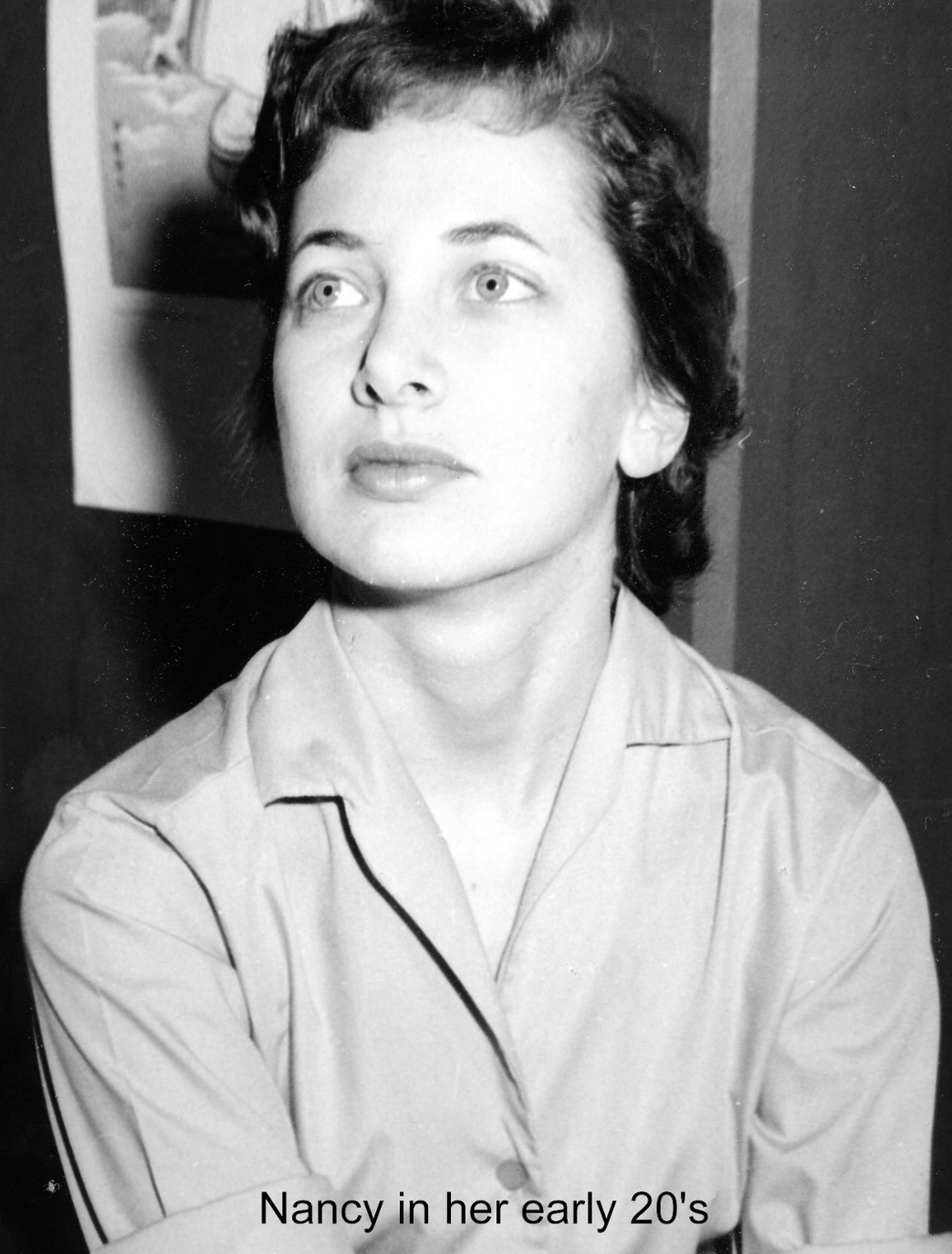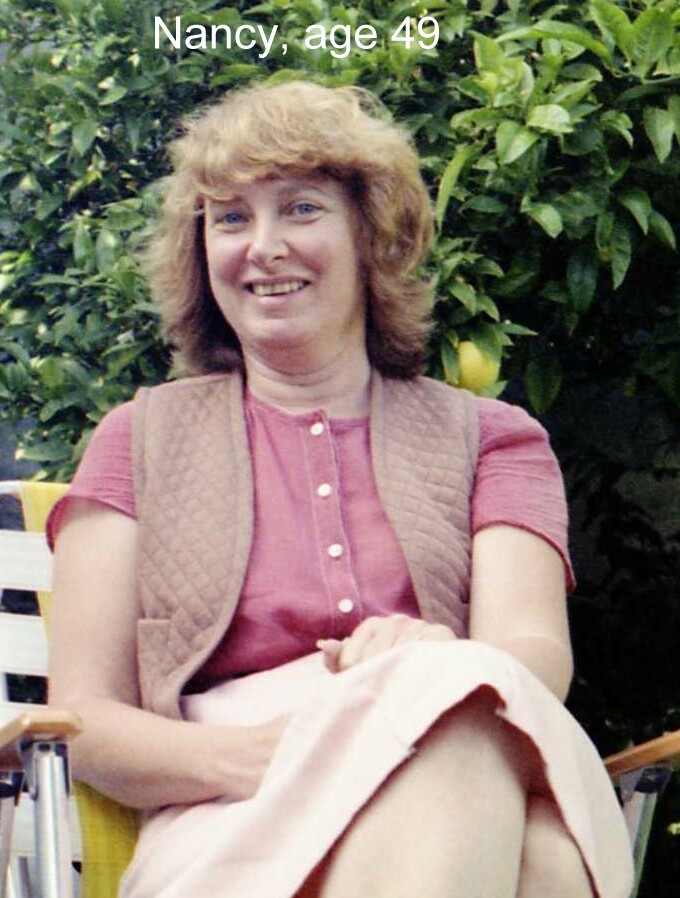Has a Death Occurred? We Are Available 24/7 ![]() (530) 206-0700
(530) 206-0700 ![]() Live Chat
Live Chat






Obituary of Nancy Jean Morgan
Nancy Jean Morgan of Placerville passed away on December 9, 2022, at Western Slope Health Center from complications following a fall, a second broken hip, and a second round of Covid-19. She was 88 years old. She was predeceased by the older of her two brothers, Richard Carleton Mehl. She is survived by her younger brother, Carter David Mehl; her sisters-in-law Paula Allred (Richard’s wife) and Anitra Balzer (Carter’s wife); her nieces, Amanda Mehl, Ursula Mehl, and Sophia Mehl; and her grandnephews Solas Mehl Coates and Caulder Mehl Coates.
Nancy was born in Akron, Ohio, on May 15, 1934, the oldest child and only daughter of Dr. Lawrence Brooks Mehl and Marjorie Yocum Mehl, both from old Ohio families. Five and seven years later her younger brothers were born. Due to parental inexperience and lack of knowledge, Nancy suffered childhood abuse which left her with life-long emotional difficulties. Her early years were spent in Cuyahoga Falls, Ohio, but soon after America’s entry into WWII, Nancy’s father enlisted in the Army as a medical doctor, and until the end of the war the family moved to different bases as her father was redeployed from Georgia, to Florida, to Indiana, and finally to California. Nancy considered those years some of the best times of her childhood, and perhaps it was those early experiences that left her with a lifelong love of travel, moving, and meeting new people.
After the war the family returned to Cuyahoga Falls, but in 1949, when Nancy was a teenager, they moved to Silver Lake, a well-to-do suburban Akron bedroom-community of professional men and stay-at-home women. The status of the neighborhood’s large houses, huge lawns, and a private lake open only to residents of the neighborhood, especially appealed to Nancy’s maternal grandmother, Blanche Yocum. While in Silver Lake, Nancy attended Old Trail School, a private girl’s high school in the Akron area. She maintained contact with some of her fellow students from Old Trail until the end of her life.
After a high-school graduation trip to Mexico (which really set off Nancy’s thirst for travel), Nancy enrolled at Earlham College, a Quaker-founded school in Richmond, Indiana. During her second year at Earlham, Nancy was attacked one night by a mentally ill young man who grabbed her, slammed her head into a tree, severely injuring her, then took her hostage and drove off to a secluded spot. By some combination of wit, and as Nancy always claimed, the intervention of “an angel,” Nancy managed to talk the young man out of doing her further harm and got him to return her to her campus dorm. She spent a week in the hospital recovering from her physical injuries, and managed to finish out the academic year. The trauma of that experience and lack of emotionally supportive follow-up care led her to transfer the following year to the University of Denver in Colorado, where she earned her BA degree.
After college, Nancy moved to Pennsylvania, where she lived in a Quaker-sponsored graduate study and retreat center called Pendle Hill, outside Wallingford, PA. Here she held various jobs, met many interesting friends, roommates, co-workers and occasional lovers. For a while she worked for the American Friends Service Committee, and took a summer-long work trip to Europe with a group of other young people, meeting people from all over the world. At the end of that summer, she moved into a cooperative community called the Friendship Coop, also run by Quakers, near the University of Pennsylvania. While there she briefly enrolled in Temple University, studying speech therapy. She wrote about many of these experiences in her autobiography, Someone Left the Cake Out in the Rain, self-published with the help of her friend, Dr. Stanley Krippner, in 2020 near the end of her life.
It was while living in Philadelphia that she met one of the most important influences on her life – Virginia Glen, an “extroverted, charismatic woman who drew people to her,” and who seemed to know everyone. Virginia lived in New York, and at her urging, Nancy moved there as well, taking classes at the New School for Social Research. Through Virginia, Nancy met all sorts of interesting people doing interesting things, including Richard Alpert (aka Ram Dass), Timothy Leary, Jean Houston, and Stanislav Grof, among many others. A few, like Stanley Krippner and Alan Watts, became life-long friends.
In 1962 Nancy moved to San Francisco and earned a Master’s degree in psychology at San Francisco State University. It was the Beat Era in San Francisco, and at first, she lived in a large, old communal house on Geary Street called East-West House, frequented by poets, beatniks, and Buddhist philosophers. All the shared household utility bills were in the name of Fred Klunge, the house cat. At SF State, she studied under the linguist, S.I Hayakawa, who later became President of the school and a darling of the political right during school protests against the Vietnam war. She had a photo of Hayakawa from those earlier days, naked at a Marin County swimming pool party, and she joked that she could use it to blackmail him in his later conservative incarnation.
It was at SF State that she met her future husband, Don Peterson, who was also working on a Master’s degree. They were married in August 1965. The day after the wedding, a second Buddhist ceremony was performed by Alan Watts on his houseboat in Sausalito. Afterwards, Watts’ wife took Nancy aside to tell her that “Alan doesn’t have a very good track record for weddings.” Nancy herself claimed later that she knew almost the minute she said her vows that the marriage was a mistake. Still, for a few years she and Don lived the good life in “Marvelous Marin” County, buying a home in Mill Valley with a view of Mt. Tamalpias, and socializing with a circle of hip intellectual friends. But the marriage fell apart, leading to divorce after 7 years.
During her last year with Don, her friend Stanley Krippner, a psychologist studying para-psychology, invited Nancy to accompany him as his assistant on an “around-the-world conference tour,” and she was thrilled to go. When the group visited the Soviet Union, all their notes and tape recordings were confiscated at the end by their Russian “minders” - except for Nancy’s, who they somehow missed. In the end, Krippner depended on Nancy’s notes to write up his report. On this trip the group also traveled to India, Hong Kong, Nepal, and Japan, before returning to California.
Upon her return, her husband arranged for them to see a therapist, where he announced that he wanted a divorce. Nancy replied, “So do I.” Over the next few years, Nancy moved out of the home she’d owned with Don, into a series of apartments shared with roommates in various parts of Marin County, traveled to Africa on a safari, and to Scotland and the Hebrides on the way home. During these years, traveling started becoming the only thing she felt could keep her happy and sane. But eventually her savings began to dwindle.
Around this time, she first started suffering from symptoms of fatigue and a variety of bodily pains, variously diagnosed as Epstein-Barr virus or fibromyalgia or chronic fatigue syndrome or chronic pain syndrome or dismissed by many doctors as “all in your head.” But it was a serious disability for Nancy. She held various jobs, as an interviewer and researcher with AMER iCore, and later – after being priced out of Marin County and moving to Sonoma - for the Women’s Emergency Shelter Program in Santa Rosa, where she turned the results of research conducted there into a book, Beyond Battery.
Nancy lived in the old mission town of Sonoma for ten years, making many friends and working where and when she could. But it was also while in Sonoma that she started becoming more and more disabled by her chronic pain; the ensuing depression, which she had struggled with much of her life, grew more serious, requiring heavy doses of pain medications and antidepressants to maintain any amount of normal life. Since at the time fibromyalgia and related conditions were not yet recognized as legitimate bases for a disability claim, when she was hospitalized for depression in 1989, she was finally able to get on SSI, but only on the basis of disability caused by her depression. Since she was by then unable to work, this was a great relief, allowing her to pay for the most basic necessities of living.
Eventually Nancy left Sonoma for Placerville, where she claimed she had finally found a true home. She had always loved the California foothills, and she made friends there through a pain-management group, and found a compatible roommate in a woman named Cricket, in whose mobile home she rented a room for over 10 years before Cricket became too old to keep up her place and moved into a nursing home. After this Nancy spent several years moving from one apartment to another, hiring people through In Home Supportive Services (a Medicaid benefit) to help her with all the physical things she was no longer able to do. Finally, in 2013 she moved into Western Slope, living there for more than 9 years.
Nancy’s problems, both physical and psychological, her need to keep secrets, to keep most friends and family members separate, and her great fear of expressing her true feelings and trusting others (which she attributed to her mother’s abusive behavior as a child) - kept her from being close to members of her own family. But in her last years she made her peace with her family, and she was still in touch with many old friends, and was still able to charm many people with her cheerful manner and interesting life story. In addition to her autobiography, during her lifetime she wrote and self-published several books of poetry, along with more technical writing done for various jobs. Her identity as a researcher, writer and artist, as well as a friend of interesting people, is probably how she’d most like to be remembered.
FD#-2299 